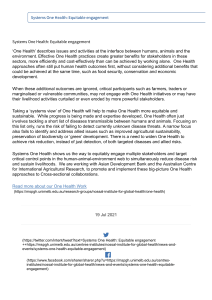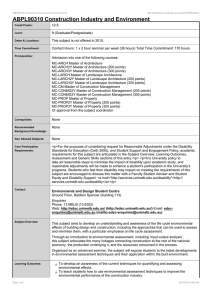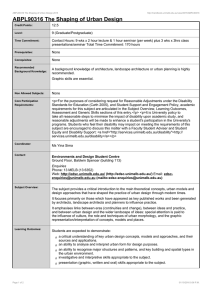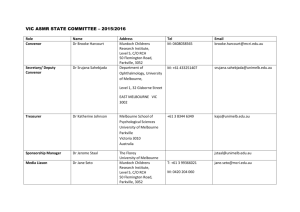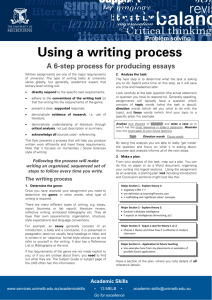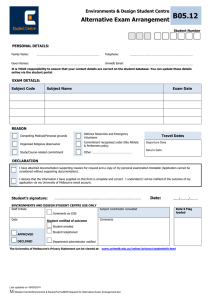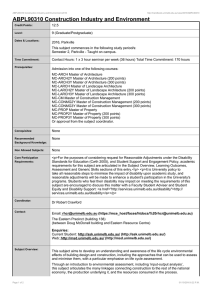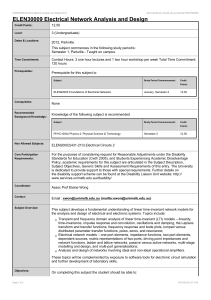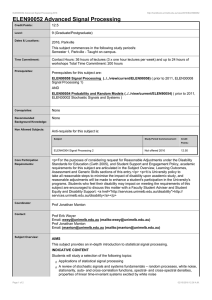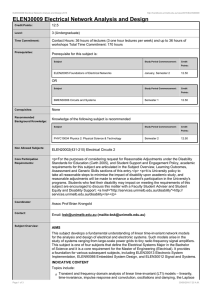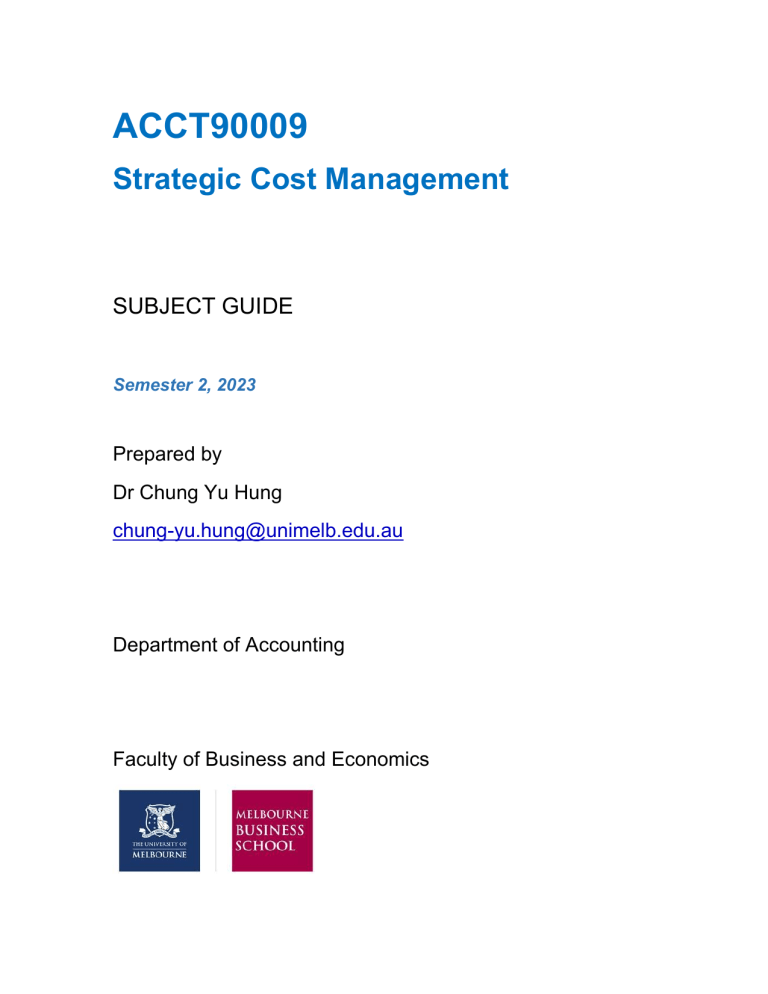
ACCT90009 Strategic Cost Management SUBJECT GUIDE Semester 2, 2023 Prepared by Dr Chung Yu Hung chung-yu.hung@unimelb.edu.au Department of Accounting Faculty of Business and Economics Subject Outline Introduction Welcome to ACCT90009 Strategic Cost Management! In this subject, we will examine topics at the interface of cost accounting and managerial decision making. You will be introduced to the concepts and processes that underpin the development of cost accounting systems and gain familiarisation with a range of techniques for the analysis and evaluation of cost information captured by these systems. In this subject, you will also investigate the role of cost accounting information in managerial decisions that relate to the efficient and effective management of organisational resources and the creation of customer and shareholder value. This guide details a range of information you will require to support your learning in this subject. The administration and assessment requirements of each subject within the business school can differ in important ways. Please ensure that you read the guide carefully and are familiar with the requirements of this subject, as well as the broader business school and University policies with which you must comply. We look forward to working with you and hope that you enjoy this subject! Subject Overview and Aims The overall aim of this subject is to highlight the relevance and limitations of cost accounting information in managerial decisions. You will also learn how cost information can be collected and aggregated to improve its decision-relevance. You will master the analysis skill and critical thinking through various case studies. See also the Subject Overview in the University Handbook (https://handbook.unimelb.edu.au/view/2023/ACCT90009). Learning Outcomes Learning Outcomes and Generic Skills To view the subject objectives and the generic skills you will develop through successful completion of this subject, please see the University Handbook: https://handbook.unimelb.edu.au/view/2023/ACCT90009 Awareness Issues At a broader level, studying this subject will increase your awareness of issues such as: • • • Measurement challenges faced by management accountants and managers in organizations; The importance of resource management in organizations and its links to business processes; The challenge of managing resources in a constrained and changing environment. 2 Eligibility and Requirements To view the eligibility and requirements, including prerequisites, corequisites, recommended background knowledge and core participation requirements for this subject, please see the University Handbook: https://handbook.unimelb.edu.au/2023/subjects/ACCT90009/eligibility-and-requirements Academic Staff Contact Details Please see the subject LMS site for full contact details of the teaching staff in this subject. Subject Coordinator Contact Details Name: Dr. Chung-Yu Hung Email: chung-yu.hung@unimelb.edu.au Consultation Hours: Please refer to LMS for the information Seminar Leader Contact Details Name: Dr. Sarah Young Spencer Email: s.yangspencer@unimelb.edu.au Name: Dr. Michael Taouk Email: michael.taouk@unimelb.edu.au Consultation Hours: Please refer to LMS for the information Email Protocol Please note that we are only able to respond to student emails coming from a University email address. Please do not use personal email addresses such as Yahoo, Hotmail or even business email addresses. Emails from non-University email addresses may be filtered by the University’s spam filter, which means that we may not receive your email. All correspondence relating to this subject will only be sent to your University email address. Note that you must first activate your University email address before you can send or receive emails at that address. You can activate your email account at this link: http://accounts.unimelb.edu.au/. While academic staff endeavor to address queries received via email, it is more appropriate to resolve substantive questions during lectures and tutorials and/or during normal consultation hours. With this in mind, we encourage students to attend all lectures and 3 tutorials and to familiarize themselves with the consultation hours offered by the lecturer(s) in this subject. Lectures and Workshops Lecture and Workshop Times This subject is composed of two teaching activities: lectures and workshops. For lectures, lectures in Week 1 and Week 12 will take 3 hours (180 minutes) and the lectures over week 2-11 will take 1.5 hours (90 minutes. The lecture capture will be available on the assigned time. For workshops, they take place from Week 3 to Week 12. Students are only expected to attend one workshop each week. Note that all teaching activities will take place on campus. You can find the detailed information on LMS about the timetable and the venue. Venue (on campus) Activity Lecture (long) Day of week Wednesday Lecture (short) Law Building David P. Derham Theatre (GM15) Workshop (Wed) The Spot 4014 Wednesday Workshop (Thu1) The Spot 4014 Thursday Workshop (Thu2) The Spot 4014 Thursday Wednesday Start time (Duration) 17:15 (180 mins) 18:15 (90 mins) 15:45 (90 mins) 11:00 (90 mins) 12:30 (90 mins) Dates Week 1 & Week 12 (26/7 & 18/10) Week 2 - Week 11 (2/8 - 11/10) Week 3 - Week 12 (9/8 - 18/10) Week 3 - Week 12 (10/8 - 19/10) Week 3 - Week 12 (10/8 - 19/10) Lecture and Workshop Participation Requirements Students will learn new materials in lectures and then apply the knowledge to problem solving in workshops. Most of workshop discussions will be based on cases. You should note that the ‘workshop’ section is not a traditional lecture where lecturers speak and students listen. Rather, the classroom environment is highly participative and will be interspersed with interactive sessions designed to reinforce the lecture objectives. Interactive sessions throughout the lecture/workshop will vary in nature and format (e.g., discussion boards). The workshop is designed to allow students to further explore concepts. You are expected to have attempted all set workshop questions before the workshop and to have pre-read all references (to the textbook and supplementary readings) before the workshop to ensure you can engage adequately during the class. You must do your best to attend the two lectures in Week 1 and Week 12 to keep yourself informed and engage with the lecturer and other students. Please pay close attention to your subject LMS site to keep informed of any changes. Lecture Schedule Week Date Commencing Topic 4 Required Reading* Introduction: The accountants’ 1 24th July 2 31st July Cost Behaviour and Estimation Chapter 2 & 9 3 7th August Job Costing Chapter 3 4 14th August 5 21st August 6 28th August 7 4th September 8 11th September 9 18th September Break 25th September No teaching activities 10 2nd October Flexible Budgets II: Overheads 11 9th October 12 16th October role and the skills required Activity-based Costing & Issues in Indirect Cost Allocation Process Costing Absorption and Variable Costing & Cost-Volume-Profit Analysis Relevant Cost Analysis for Decision Making Pricing and Target Costing Standard Costing Systems and Flexible Budgets I: Direct Costs Cost Management in Quality and Time Subject Review Chapter 1 Chapter 5 & 11 Chapter 4 Chapter 7 & 8 Chapter 10 Chapter 12 Chapter 14 & 15 Chapter 16 Chapters 20 & 21 All Lecture Slides and Workshop Materials Lecture slides will be placed on the LMS page for this subject prior to each lecture. Some learning materials (e.g., cases) used in workshops will be available under “Readings Online” on the LMS page prior to each workshop. Recorded Lectures Audio or video recordings of “lectures” delivered in this subject will be made available. You can access recorded lectures by clicking on the Lecture Recordings (or similar) menu item on the LMS page for this subject. However, the recording of workshops will NOT be made available. Please note that for lectures or workshops, recordings are not a substitute for attendance; rather they are designed for revision. Students are expected to participate in group discussions rather than review them. 5 Private Tutoring Services The Faculty has become increasingly concerned about the existence of a number of private tutoring services operating in Melbourne that heavily target University of Melbourne students enrolled in FBE subjects. Students are urged to show caution and exercise their judgement if they are considering using any of these services, and to please take note of the following: Any claim by any of these businesses that they have a “special” or “collaborative” or “partnership” style relationship with the University or Faculty is false and misleading. Any claim by a private tutoring service that they are in possession of, or can supply you with, forthcoming University exam or assignment questions or “insider” or “exclusive” information is also false and misleading. The University has no relationship whatsoever with any of these services and takes these claims very seriously as they threaten to damage the University’s reputation and undermine its independence. It is also not appropriate for students to provide course materials (including University curricula, reading materials, exam and assignment questions and answers) to operators of these businesses for the purposes of allowing them to conduct commercial tutoring activities. Doing so may amount to misconduct and will be taken seriously. Those materials contain intellectual property owned or controlled by the University. We encourage you to bring to the attention of Faculty staff any behaviour or activity that is not aligned with University expectations or policy as outlined above. Assessment Assessment Overview Your assessment for this subject comprises the following: Assessment Task Individual or Group Due Weighting End-of-semester Examination Individual During the exam period 55% Group Friday 15th September 25% [3 hours] Assignment Online Tests [5 tests at 2% each] Class Participation Individual Individual Week 3, 5, 7, 9,11 (7/8, 21/8,4/9,18/9, and 9/10) Throughout the semester 6 10% 10% Assessment Details End-of-Semester Examination: The end-of-semester examination is three (3) hours in duration and will be held during the University’s examination period (Monday 30th October to Friday 17th November 2023). You must make yourself available for the exam at any stage throughout this examination period. The exam will include a variety of questions designed to test your mastery of the subject’s objectives. Workshop questions, in-class exercises, and the group assignment are also indicative of the types of questions that may be included on the exam. Further details regarding the exam will be provided in Week 12 Lecture. The end-of-semester examination is likely to be computer-based but conducted in an off-line environment. Hand-writing responses may not be feasible in the computed-based examination format. Students can prepare themselves for this as early as possible. Special Examinations There are no supplementary examinations for subjects taught in the Melbourne Business School, however, the examiners for this subject may require students to present for further written or oral tests (special examinations) to be held before the publication of results at the end of the semester. Please be aware that only very short notice of these tests can be given and thus, it is very important that you can be reached at the address and phone number held by the University. It is your responsibility to notify student records of any change to your contact details and to ensure you are available for further assessment. If you fail to avail yourself of the opportunity to sit for a special exam (for whatever reason) you should not expect to be offered another exam. Assignment: Group Work (25%) The assignment is due by 5:00 p.m. on Friday, 15th September 2023. Further details regarding the assignment will be distributed via the LMS page during the semester. This is a group assignment. The maximum group size will be advised when the assignment is released. No exceptions to this group size are permitted under any circumstances. The work you submit must be the work of your own or your group. All assignments will be checked electronically using a plagiarism detection tool. Significant penalties are imposed where assignments are found to be plagiarised. Further information and links to references with respect to plagiarism are included later in this section. You are also referred to the University’s policy on academic integrity http://academicintegrity.unimelb.edu.au/ Working in a group, at times, poses greater challenges. All students within your group will be given the same mark unless you have raised an issue during the assignment period. Students who do not satisfactorily contribute to a group assignment may be allocated a lower mark or assigned a mark of zero. 7 Online Tests: You are required to complete five online tests throughout the semester. These tests will be held in Week 3, 5, 7, 9 and 11. Dues dates and times for these tests are advised on the LMS. Each test contains questions in various formats, e.g., multiple-choice or numerical-answer questions. You only have one attempt at each of the online tests. Once you begin the test, you must finish the test. Questions are delivered online one at a time. You must submit an answer to a question in order to progress to the next question on the test. Once you have submitted an answer you cannot later revisit the question. These measures are intended to promote fairness between students in an online assessment environment, as they help minimize opportunities for academic misconduct. You will have 60 minutes to complete each test. After this time, your responses will automatically be saved and submitted. Tests are accessed and completed via the LMS subject page. It is imperative that you use a PC or Mac to access LMS when completing the tests. The online tests may not be compatible with mobile devices, such as mobile phones and tablets. NO special consideration will be granted for problems completing the online tests when using a mobile device. Please note, it is possible for you to determine the type of device you used to attempt each test. You must also ensure that you attempt the online test using a stable internet connection. i.e., do not use free public wi-fi or other unreliable services. Stable internet connections are available to all students free of charge on campus. Assignment Submission Assignment submission is via LMS. You will find the submission instructions on LMS in due course. Please note that you are required to keep a copy of your assignment after it has been submitted as you must be able to produce a copy of your assignment at the request of teaching staff at any time after the submission due date. Submission of Late Assignments Within this Subject Late assignments will not be accepted. Students cannot do the group assignment and online tests any later than the due deadline. Students with a genuine and acceptable reason for not completing an assignment (or other assessment task), such as illness, can apply for special consideration. Special Consideration assists students who have been significantly affected by illness or other serious circumstances during the semester. The following website contains detailed information relating to who can apply for Special Consideration and the process for making an application: http://students.unimelb.edu.au/admin/special 8 Subject Resources Prescribed References The textbook can be available in the following ways: Print book • Booktopia: https://www.booktopia.com.au/management-cost-accounting- alnoor-bhimani/book/9781292232669.html • Pearson (currently 15% off and free shipping within Australia): https://www.pearson.com.au/9781292232669 eBook (ongoing access AUD$60) • https://www.pearson.com.au/9781292232683 You can access the ebook via the UniMelb VitalSource platform. This applies to students overseas. Copies of the prescribed textbook are also available from the High Use Reserve in the Giblin-Eunson Library. Supplementary Readings Supplementary readings will also be provided seminar by seminar. All supplementary references will be made available via LMS. Readings can be located under the ‘Modules’ or “Readings Online” in the relevant week. Academic Integrity Academic Honesty The University maintains high academic standards in its courses and subjects and expects students to conduct themselves in a manner which is fair, honest and consistent with the 9 principles of academic integrity, particularly when undertaking assessment and research. http://academicintegrity.unimelb.edu.au/ Referencing Each source used for a written piece of assessment must be referenced. This is to acknowledge that your material is not based entirely on your own ideas, but is based, in part, on the ideas, information, and evidence of others. This is desirable as you are attending University in order to learn from others. You will be required to use the APA system or Harvard System of referencing. The library has prepared a website to help students correctly reference: http://www.library.unimelb.edu.au/recite It is important that all material you present for assessment is referenced correctly. Material that has not been referenced correctly may be considered to be plagiarised, and as such may be penalised. We will also look for evidence that material included in the bibliography has been used in the assignment. The Academic Skills Unit has produced resources to assist students with referencing https://services.unimelb.edu.au/academicskills/undergrads/top_resources The Library also provides advice on referencing: http://library.unimelb.edu.au/cite University Services Timetable MyTimetable is a class timetabling system that creates individual timetables for students based on submitted class preferences, ensuring everyone has an equitable opportunity of getting their preferred class timetable. You will use this system to create your class timetable prior to each study period. By following a preference-based model, students who have other commitments, such as employment or carer responsibilities, or who are returning or living overseas during the timetabling period, aren’t disadvantaged by their limited availability. When allocating class timetables, MyTimetable also takes into consideration factors such as class size limits and potential clashes to ensure all students are equally accommodated. Further information is available on the web at https://students.unimelb.edu.au/admin/class-timetable Stop 1: Connecting Students and Services Stop 1 is here to provide you with a range of support services throughout your university degree, from help with enrolment, administration and wellbeing to advice on building your skills and experiences. https://students.unimelb.edu.au/stop1 10 Academic Skills Academic Skills offers a range of workshops and resources to help you with study skills including researching, writing and referencing, presentation skills and preparing for exams. Visit their website via http://services.unimelb.edu.au/academicskills. Service Finder The University of Melbourne offers one of the most comprehensive student support networks in Australia. Use this site to locate a wide range of services http://services.unimelb.edu.au/finder Student Counselling Students attend counselling to talk about personal, emotional, or mental health issues which might be affecting their study and life. The University’s Counselling and Psychological Services (CAPS) provides free, confidential, short-term professional counselling to currently enrolled students and staff. https://services.unimelb.edu.au/counsel/individual Student Equity and Disability Support Student Equity and Disability Support provides services for students who need ongoing support with their studies. They understand that adjustments to learning and assessment are sometimes required to allow all students to reach their full potential. Learn more about the services provided, how to find support and how to register for assistance. http://services.unimelb.edu.au/student-equity University of Melbourne Library Services As well as holding an extensive collection of books, ebooks, digital media and periodicals, library staff provide research guidance and support for students. http://library.unimelb.edu.au/ These Business and Economics Library Guides have been designed specifically for Faculty of Business and Economics staff and students. http://unimelb.libguides.com/sb.php?subject_id=80310 Policy Alternative Exam Arrangements (AEA) The definition of and eligibility requirements for alternative exam arrangements (AEA) can be found via http://students.unimelb.edu.au/admin/alternate. Assessment and Results Policy The University’s assessment policy provides a framework for the design, delivery and implementation of assessment of students in award and non-award courses and subjects. Assessment is designed to contribute to high quality learning by students, and to allow for 11 quality assurance and the maintenance https://policy.unimelb.edu.au/MPF1326 of high academic standards. Exam Policy The University requires that you are available for the entire examination period. Please see the University's Principal Dates via https://www.unimelb.edu.au/dates for the full annual calendar. Supplementary exams will not be provided in cases of absence during the examination period unless the absence is due to serious illness or other serious circumstances and a Special Consideration application is submitted and approved. Information on Calculators in Examinations Effective from 1 January 2017, the approved calculator for all subjects is the Casio FX82 (any suffix). No equivalent models of calculators will be permitted in exams. You are required to purchase your own calculator and are responsible for ensuring your calculator is in good working order with fresh batteries. Plagiarism and Collusion Plagiarism (failure to cite your sources correctly and completely) and collusion (unauthorised collaboration with another person to prepare an assessment task) are considered academic misconduct and attract severe penalties. More information is available on the University’s Academic Integrity website via http://go.unimelb.edu.au/rha6. Special Consideration As a student, you may experience extraordinary or unusual circumstances, or ongoing circumstances that adversely affect your academic performance. The University has policies in place to support students who are experiencing academic disadvantage. For more information, visit http://students.unimelb.edu.au/admin/special. 12
